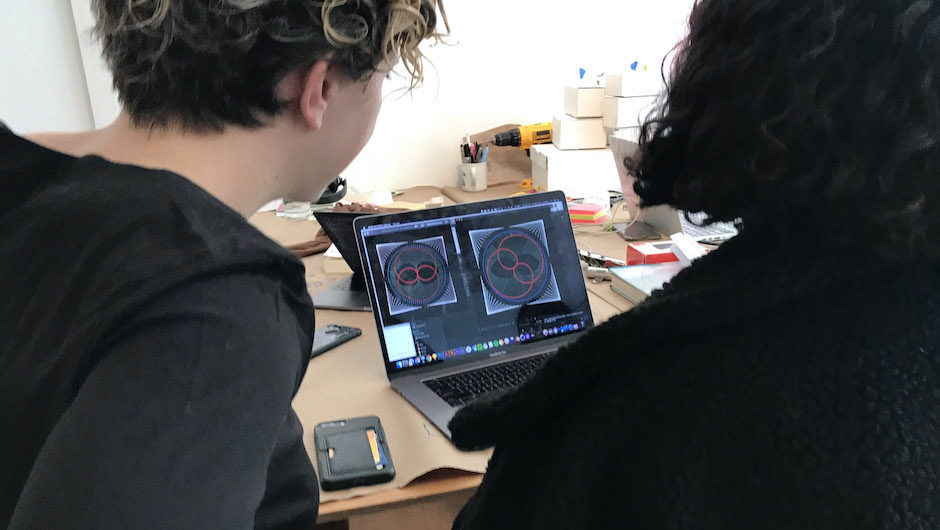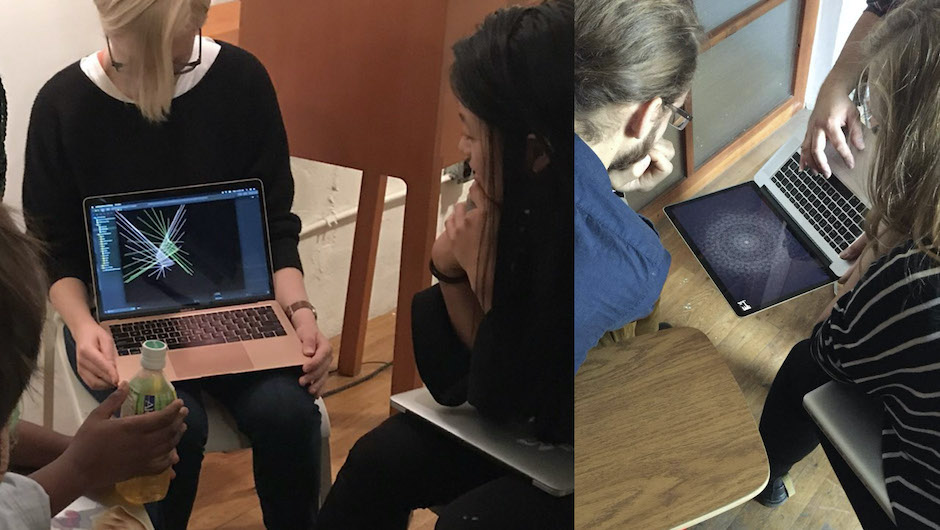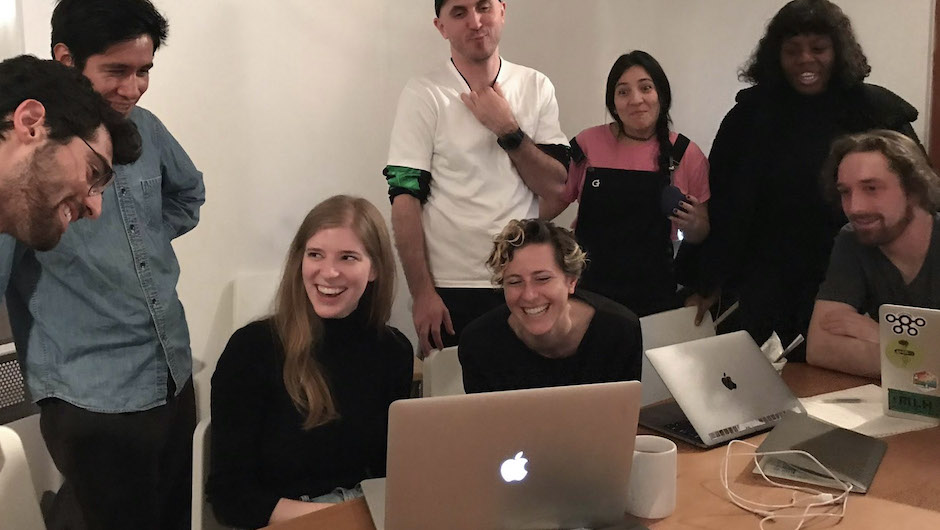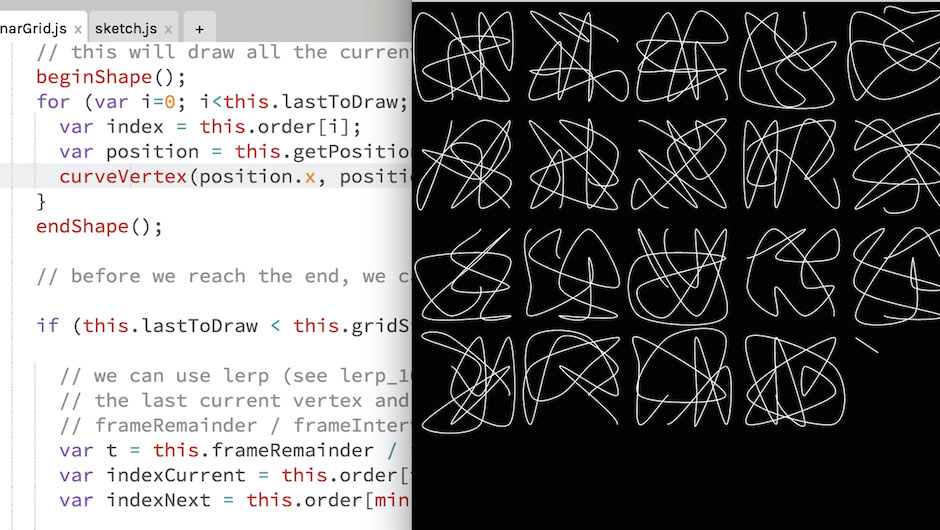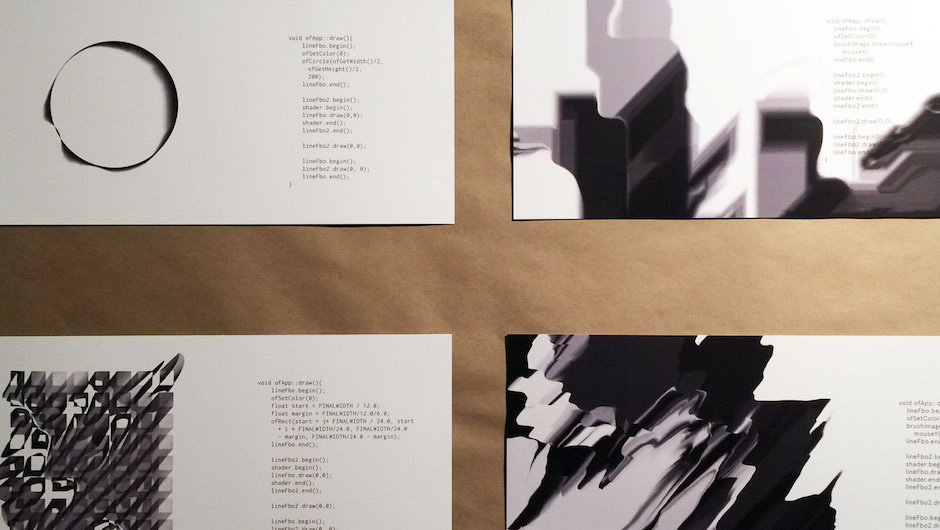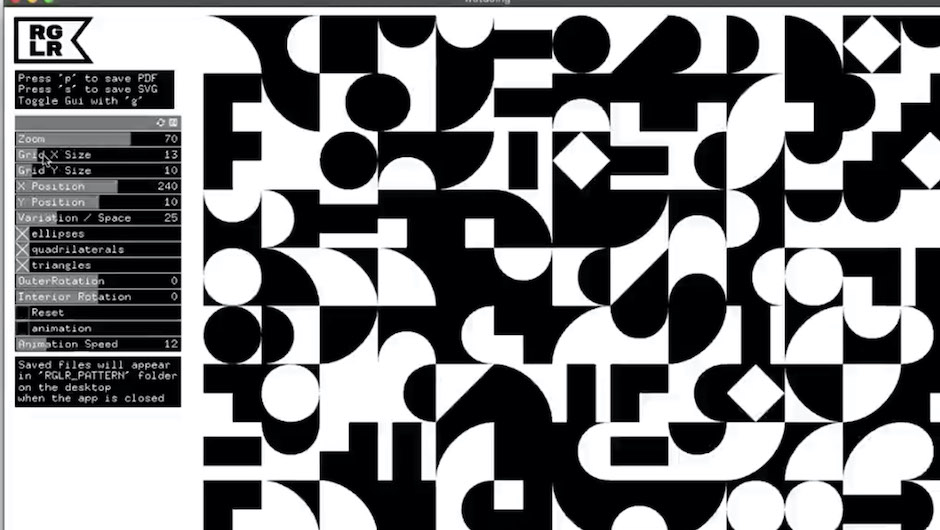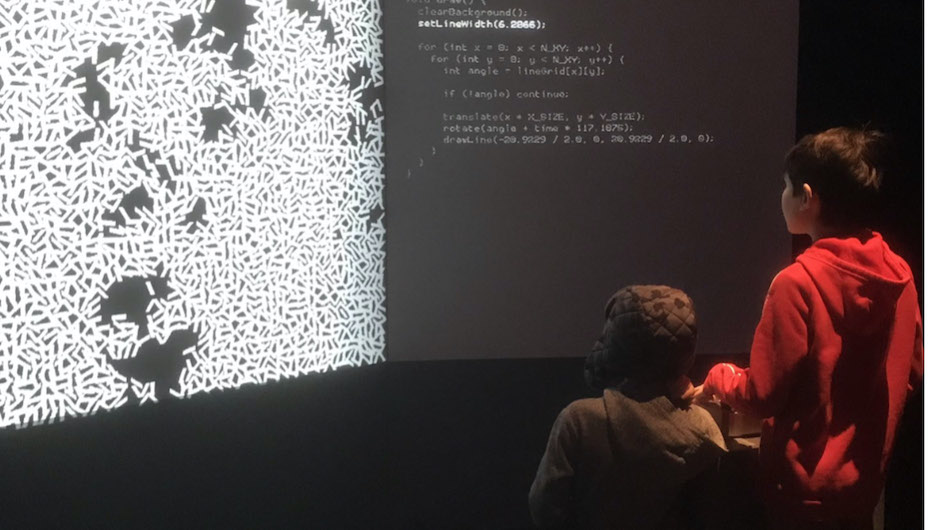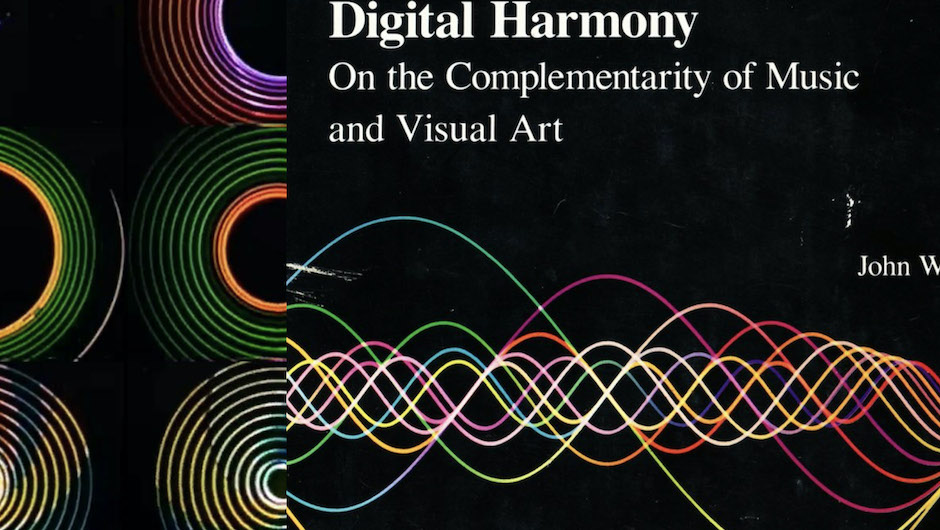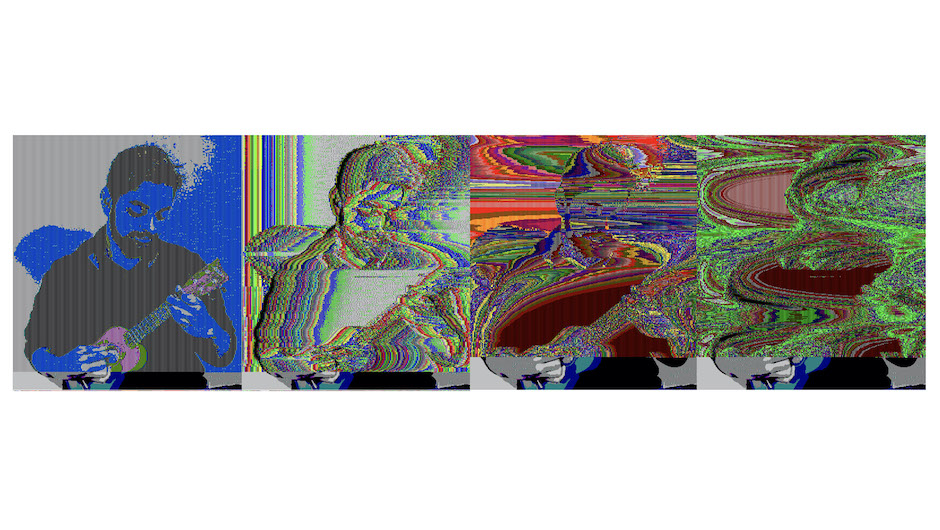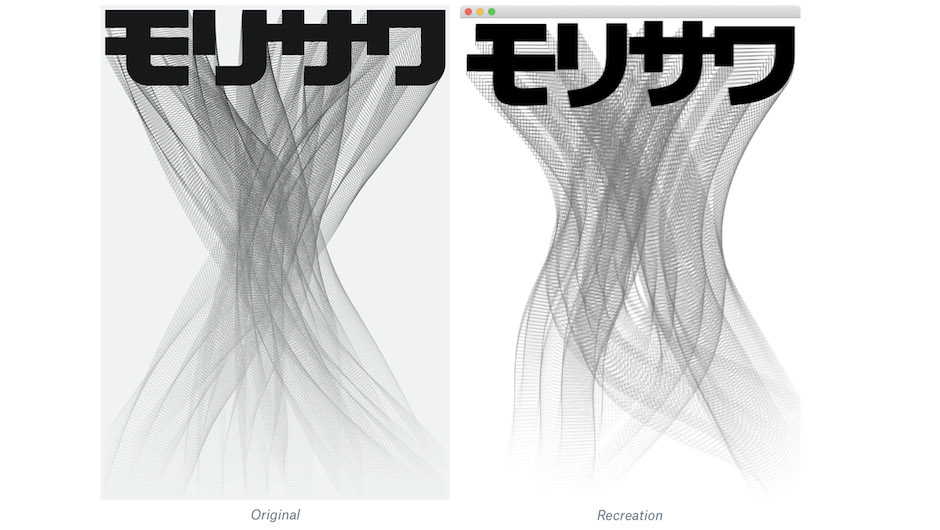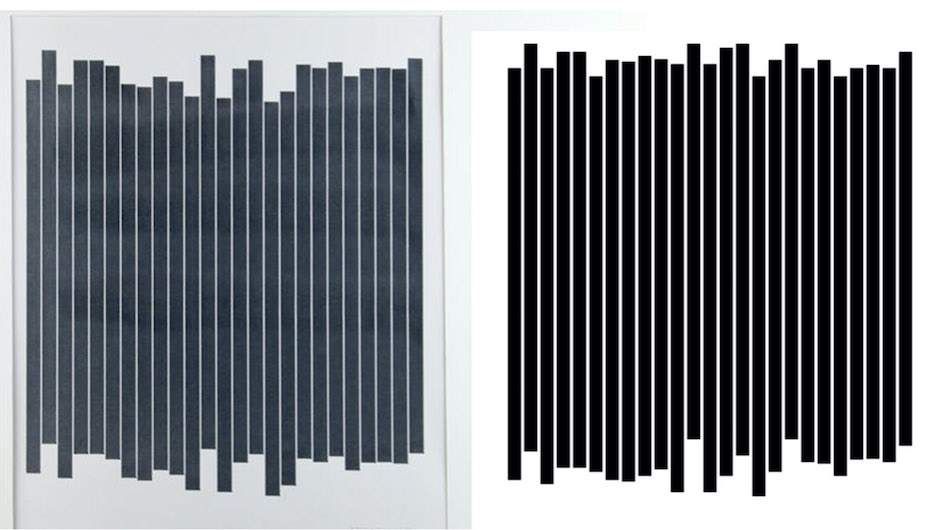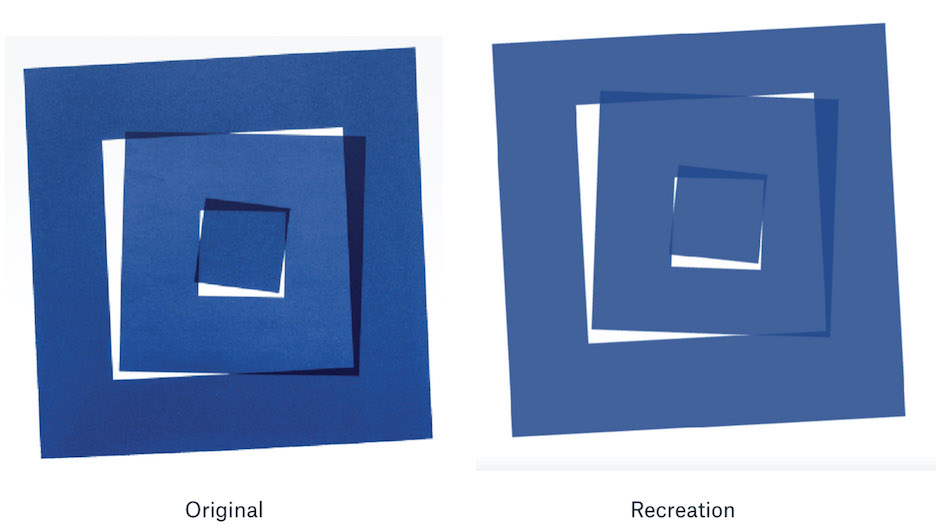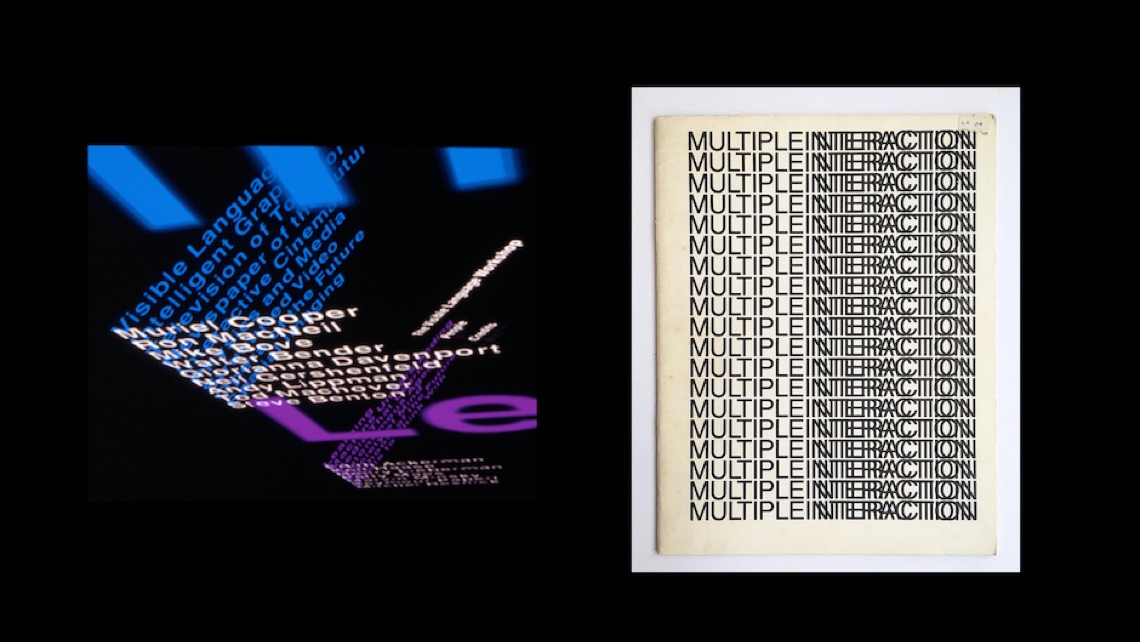Recreating the Past
- Date: Starting in May 21st, 2020, once a week on Thursday 1-3pm EST for ten weeks
- Teacher: Zach Lieberman
- Application is now open until May 12th, 2020
Class Description
In Recreating the Past, we will study computational art from the past decades and recreate these works with contemporary techniques to gain aesthetic, analytical and technical knowledge. The class is led by artist and SFPC co-founder Zach Lieberman, and will be offered online for the first time.
For each class, we investigate a different set of artists that have created work with software (either through code or algorithmic processes) and then recreate their artworks from scratch, discussing their approaches and tools, as well as poetic underpinnings. By recreating historic works, we also investigate what modern tools and approaches have to offer. In addition, we will also look at broader examples of what the artwork teaches us about algorithmic approaches and conceptual explorations. For example, seminal works like Camille Utterback and Romy Achituv’s “Text Rain” can be used as a starting point for discussing computer vision-based interaction. The class will focus on the building blocks of media art and generative design practice, such as algorithmic composition, typography, imaging, computer vision, audio analysis / synthesis, and interaction design.
Students will be encouraged to begin a practice of generative visual sketching in whatever medium they feel comfortable in and share their process amongst the cohort. Class examples will be prepared in openFrameworks which is written in C++ and built on top of OpenGL. Although the assignments will be required to be completed via coding, the class is open to a variety of skill and experience levels. The lead teacher and teaching assistant will help to get you up to speed. Students are expected to have basic knowledge of coding and familiarity with using variables, functions, control structures. If you are a beginner, we recommend you take SFPC Coding Bootcamp before applying for this class.
Topics
Here are examples of some of the artists / works / ideas we will be exploring across the ten weeks paired with the technical topics we will discuss. Each week we will explore an individual or pair of artists/designers and examine their work and process in detail.
- Chaos and Order (Vera Molnar)
- Animation and Harmony (John Whitney)
- Computational Typography (Muriel Cooper / John Maeda)
- Pattern (Bridgette Riley / Anni Albers)
- Pixels (Ken Knowlton / Lillian F. Schwartz)
- Images (Nancy Burson / Jason Salavon)
- Body (Camille Utterback and Romy Achituv / Myron Krueger)
- Glitch / Deformation (Rosa Menkman / Steina and Woody Vasulka)
A more detailed syllabus will be shared in class with specific readings and assignments.
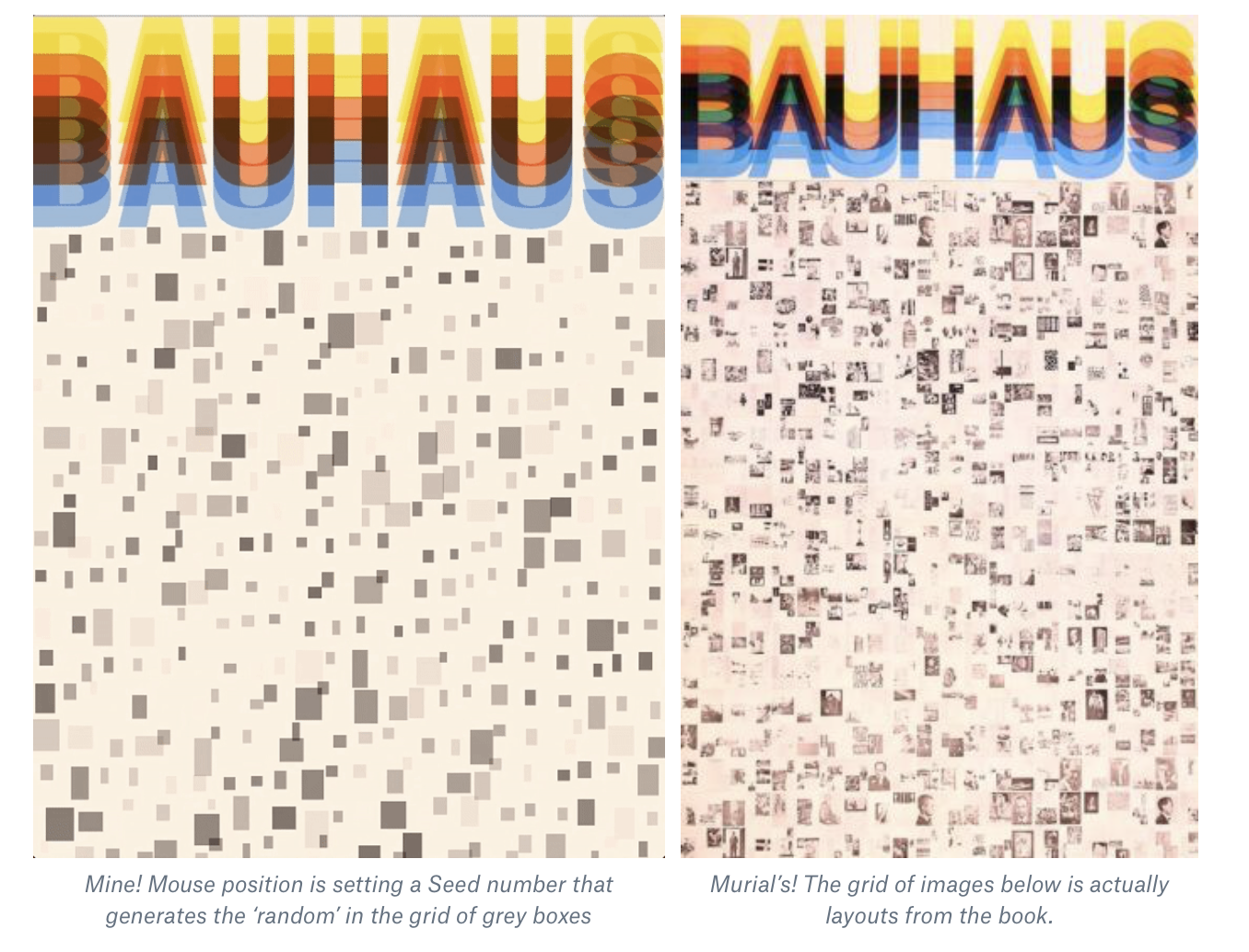
From our students
“now, being months after taking this course, I think back on RTP often because the works we recreated are so relevant to the designs we see in our everyday walk down the street or strut through an exhibit. I look at fonts and typography and placement on posters. I analyze digital aesthetic structures with a more informed eye because I learned the how/what/why of appreciating the past. RTP gave me technical tools to learn how to appreciate the bedrock of the future - our past.” Oceane Boulais (MIT)
“RTP is a great class with a strong workshop vibe. Using past works as a basis for creating new pieces is liberating, and it’s gratifying to see all the pieces come together as an output of this journey! Zach’s teaching style is refreshing as it blends discussions about different artistic perspectives with some practical coding tips to help us materialize our ideas.” Joanne Leong (MIT)
“Yes, Recreating The Past taught me a lot about coding. But for me, it’s value as an art history class, as an exercise in the importance of archiving, preservation, and curation, felt like a home I’d always been searching for. History is not a passive subject you simply consume, but an active form, something you “do,” and this was one of the only classes I’ve ever been in that seemed to not only understand that, but revel in it.” Max Neely Cohen (SFPC)
“I loved it! There is theory and history to make the practice more enjoyable. I particularly like the title of the class. It’s a way of saying something else. It could have been called “code”, but the name talks a lot about other things.” Javier De Azkue (SFPC)
“In Recreating the Past, I learned to look closely at works of art in a way that I had never done before. It was an engaging introduction to the history of computational art that helped orient my search for more inspiration in the space. Most importantly, RTP reminded me of the creative possibility of mathematical and algorithmic thinking in the context of art.” Bomani Oseni McClendon (SFPC)
How do I know if this class is right for me?
This class is right for you if:
- You have a basic knowledge of code (for example, you’ve taken SFPC bootcamp class or have experience with coding in p5, etc)
- You have access to a computer that can run openFrameworks
- You are interested in learning the craft of creative coding
- You enjoy researching / learning about how artists work
- You agree with SFPC Code of Conduct
- You enjoy working with others
This class is not right for you if:
- You have no experience with code
- You are interested in a more skills based, less theoretical approach to learning creative code
- You are not interested in research or engaging with artworks from the past
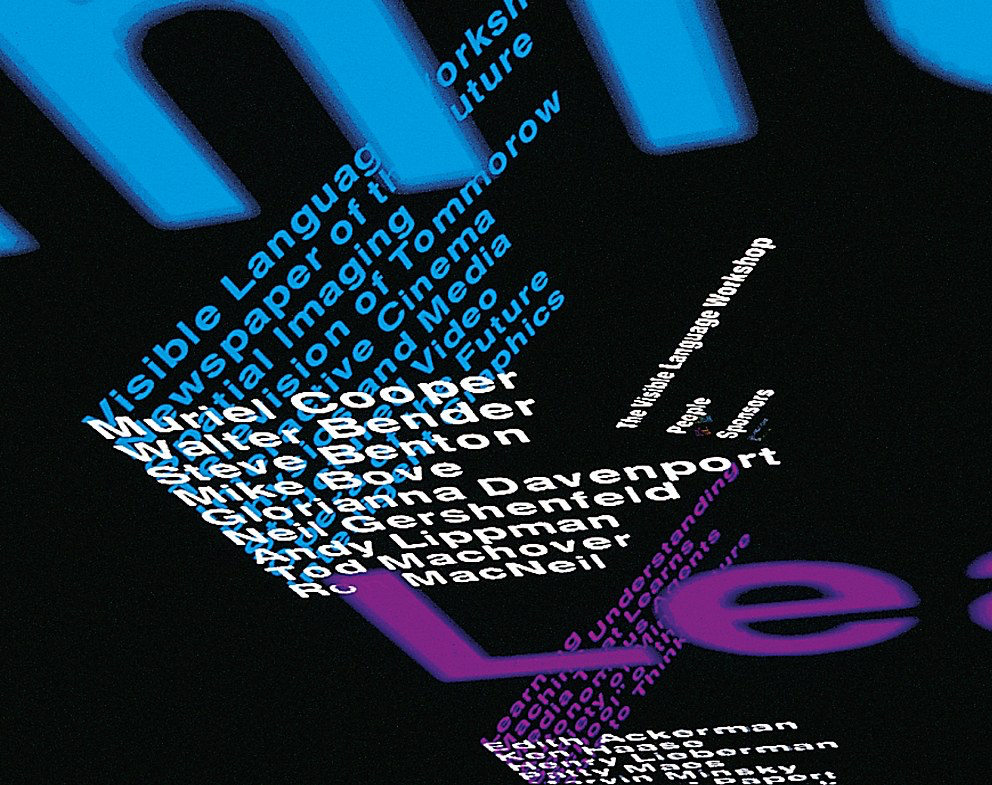

How will this class work online?
The class will be taught for 2 hours weekly with an additional ½ hour to 1 hr or asynchronous content which includes short lectures and code explanations. The homework will take additional time per week depending on the complexity of the artwork being recreated (Estimated 1-4 hours / week). In addition the teacher and TA will each offer 2 hours of office hour support, at a scheduled time TBD throughout the week. We will use github, dropbox paper, and slack as our primary tools with zoom used for the class meetings and TA hours. Recordings of the live portions of each class will be archived and shared with participants for a limited time.

Instructors
Teacher: Zachary Lieberman is an artist, researcher, and educator with a simple goal: he wants you surprised. In his work, he creates performances and installations that take human gestures as input and amplify them in different ways – making drawings come to life, imagining what the voice might look like if we could see it, transforming people’s silhouettes into music. He’s been listed as one of Fast Company’s Most Creative People and his projects have won the Golden Nica from Ars Electronica, Interactive Design of the Year from Design Museum London as well as listed in Time Magazine’s Best Inventions of the Year. He creates artwork through writing software and is a co-creator of openFrameworks, an open source C++ toolkit for creative coding and helped co-found the School for Poetic Computation, a school examining the lyrical possibilities of code. He is also an associate adjunct professor at MIT’s Media Lab where he runs the Future Sketches group.
Teaching Assistant: Max Bittker is a teacher, creative researcher, and computer artist building creative tools that empower people to learn and express themselves through play. His practice is centered in extending care towards digital materials and towards human emotional capacity. Can the error message be a conversation? How can communication in a digital medium embrace the mess and complexity of human thought? Why does video conferencing software make those weird artifacts when it breaks? Max’s educational philosophy has been shaped by unlearning environments like SFPC & The Recurse Center, and is informed by critical perspectives on technology & power. He is an incoming adjunct professor at NYU ITP teaching “Hand Held: Creative Tools for Phones” in Fall 2020.
How do I apply?
Application is now open until May 12th, 2020. We evaluate applicants based on their written responses and work sample. We prioritize diversity of our students. In some cases, we may recommend you to participate in another way, if you are too experienced for the class or if you need to take pre-requisite to fully take advange of the class.
We will be accepting up to 15 students on a rolling basis. Rolling admissions means there are fewer and fewer slots the longer you wait, so if you’re interested in the program get your application in early! If you are accepted, you will get a link to Eventbrite where you can register and make payment.
How much is tuition?
$1200 USD + Eventbrite Processing Fees. Upon payment, your space in the class will be reserved.
We are completely self-funded, which dramatically limits our ability to offer scholarships. While we price our classes reasonably to offer quality learning experiences, we understand the tuition is beyond the reach of many people. We are sensitive to the rapidly changing economy due to the COVID-19. While we can’t offer scholarships like the past, we hope to support students in need. Our previous students have received support from cultural foundations, schools, current employers, or crowdfunding. We are happy to provide supporting materials as proof of acceptance. Please check out these resources for financial support in response to the COVID-19 pandemic.
We are committed to being fully transparent about how we make and spend money. In the spirit of radical openness and generosity, on which the school was founded, we open-source our finances on Github. There, you can read financial reports and download raw statements.
What if I can’t go, can I get a refund?
- Yes, we can give you 100% refund up to 10 days before class starts
- 50% refund after 10 days, until the first day of class
- No refunds can be given after the first day of class
Accessibility
Our classes are conducted in spoken English with audiovisual materials such as slides, code examples and video. All classes will be held over Zoom until further notice. Please contact us if you need a special accessibility requests. In the past, we worked with American Sign Language Interpreters and Visual Interpreters, as well as accessibility and disability rights organizations to make our classes more inclusive. Our programs are rapidly changing due to the COVID-19, we are adjusting to the needs of our community. Please help us become more accessible and inclusive. info@sfpc.io
SFPC Recreating the Past Spring 2020
Application is now open.
Feel free to reach out to us if you have questions about the school: info@sfpc.io
SFPC is filled with amazing people and an open mindset to learning, and doing. It has taught me different ways of thinking, ones that I would be sure to bring back to my endeavors outside of the art world.
I'm half way through the program and I'm already missing being here. SFPC was a much needed breath of fresh air in my hectic creative existence, an unlikely place to stop and remind myself what was it I was into in the first place.
SFPC messed up my life a little bit. Actually, I think it's going to mess it up a lot. Before this program I thought I knew what I was doing and what the shape of my life was going to look like. Now I don't and each day I wake up scared I won't get to be a part of a community like this again. Everyday also now brings a fresh but welcome creative terror to overcome. Also I think I may have ended up moving to New York accidentally.
SFPC is the best place you can explore your interest as much as you want and the place you start to write your own poem.
SFPC is not really a school or a course — it is more like a door into an extraordinary world. It is driven by passion, kindness and the thrill of teaching and learning. I would love to live those inspiring weeks all over again.
SFPC was amazing — life-changing even — i want to do all this stuff for the rest of my life!
I've never been consistently surprised and inspired as much as at SFPC.
If you think SFPC is what you think, that will be wrong. SFPC is a space for a group of people who badly want to try something new. SFPC will become a spirit embedded in your blood which makes you think things with a different angle, just like its motto: more poetry, less demo.
I learned a lot at SFPC. It was only a 2 week program last time, but I learned many things from other participants and got the chance to explore and fail freely. SFPC helped me to reshape the way I think. It's your turn.
School For Poetic Computation is equal parts The Factory, childhood blanket fort, and mad scientist's lab. I learned a ton from the teachers and the whole SFPC community in a huge collaborative and exploratory environment.
Attending SFPC is like walking into an all day buffet supplied with food from hyper-talented chefs. There's more than you could ever consume, naturally, and you will most likely find yourself requiring a digestion period, but holy crap is it tasty.
My takeaway from SFPC: Never settle for code that isn't at least a little bit magic
In SFPC I found a great community and it gave me the confidence to take on coding projects I couldn't have done before.
SFPC is the purest, most honest exchange of knowledge and experience among peers I have ever experienced. It is a supportive space where everyone learns from everyone, and bridges are built that continue to be strengthened for years to come. You won’t get a certificate or a title at the end of it, but I would be amazed if you ever looked at your world the same again. I haven’t.
